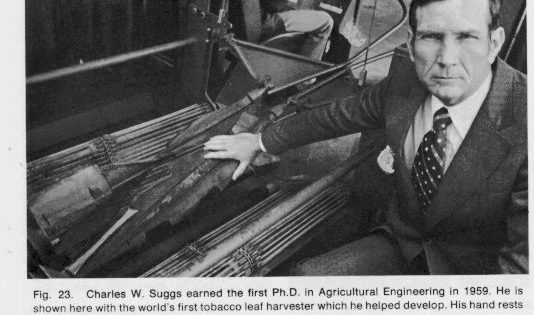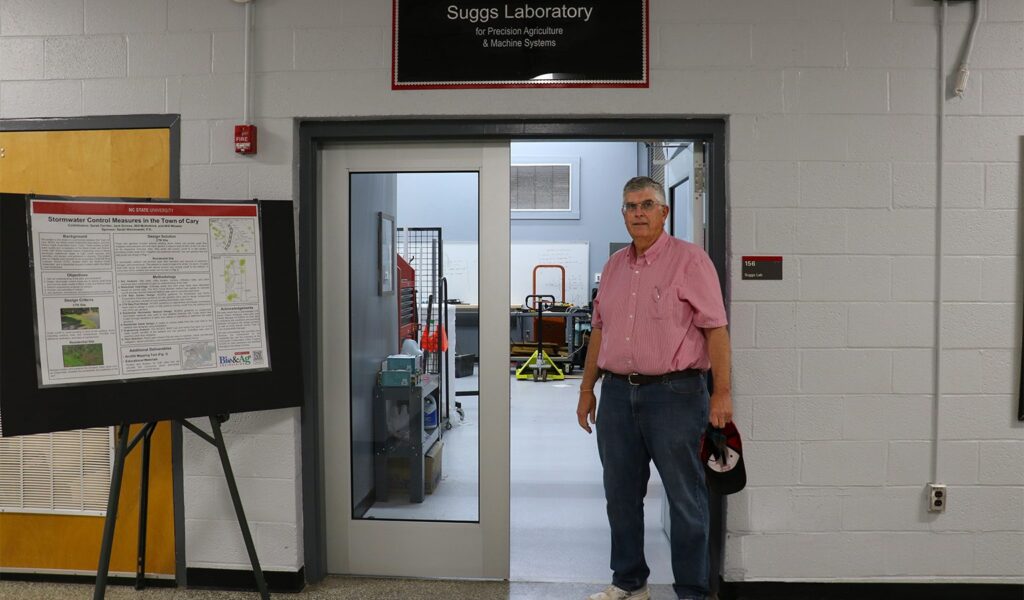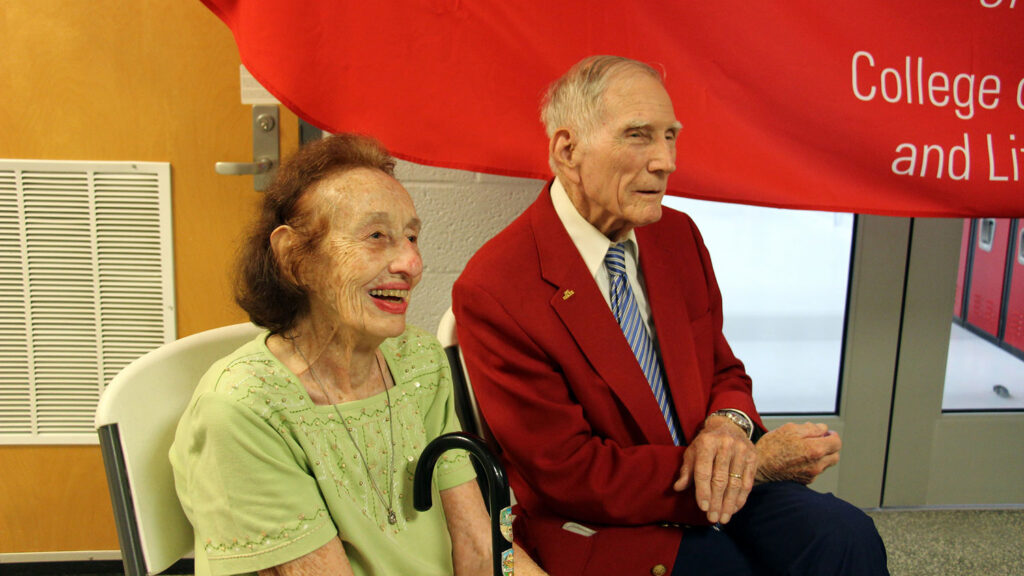
Fifty years ago, when Gary Roberson first stepped onto NC State’s campus, things were a bit different than they are today. Enrollment numbers hovered around 15,000 students. A gallon of gasoline cost $0.53. Richard Nixon was president of the United States.
That year, of course, was 1974. Back then, the NC State men’s basketball team won its first national championship. At the same time, Roberson was a freshman from Bear Grass — a small town in eastern North Carolina between Greenville and Williamston.
Today, however, Roberson is retiring as the Charles W. Suggs Distinguished Professor and Extension Specialist in the College of Agriculture and Life Sciences’ Department of Biological and Agricultural Engineering.
His journey to this moment, along with the beloved mentor whose namesake title he holds, has been nothing short of memorable.
A Family Atmosphere
Hidden in the southwest corner of Central Campus stands Weaver Labs, home to the storied Department of Biological and Agricultural Engineering (BAE). First begun as the Department of Agricultural Engineering in the 1939-40 academic year, today BAE consistently ranks as one of NC State’s top departments. It was chosen fourth-best in the nation for undergraduates in 2023 by U.S. News & World Report.
Roberson earned two bachelor’s degrees in 1978, one from the department and the other in agricultural education. After finishing a master’s degree in BAE in 1980, he left campus for three years to work in the equipment manufacturing industry.
It wasn’t long, however, before he found himself back at NC State. There had been a downturn in the business in 1983 when he received a phone call from Pat Hassler, the former head of the department. Roberson and his wife made the decision to return that year.
He hasn’t left since. A big reason why? The people.
“This department has a family atmosphere,” Roberson said. “You walk down the hall, you feel like you’re among friends. It’s very collegial; very, very team and goal-oriented. . . . That’s a great environment to work in.”
His position as a professor and Extension specialist means every day brings a new set of challenges. Roberson spends roughly 65 percent of his time on academic duties and 35 percent on Extension.
As a machinery specialist, his research involves analyzing and adapting agricultural machinery like tractors and combines to better help farmers produce crops. On the precision ag specialist side, he looks at how to best blend and implement GPS and GIS (geographic information systems) in a farm management system, something that provides a wealth of data to farmers.
“Equipment is a lot different than it used to be,” Roberson said. “We’re putting more computing power in the cab of a tractor now than most people have in their home.”
Teaching is a passion too. Roberson loves being able to give his students a starting point and watch them take off. It’s always fulfilling for him to run into former students who got their start in his lab and are now successfully integrated in their fields.
One Man’s Influence
Charles W. Suggs was the first person to receive a doctorate from BAE in 1949. Similar to Roberson, he left NC State for a couple years after graduating before returning as a faculty member. He retired in 1993 after 40 years in the department.

You’d be mistaken if you believed Suggs’ time with BAE and NC State ended there, however.
“Since he retired, he attended every graduation ceremony in this department as long as he was able,” Roberson said.
On the research side, Suggs was a pioneer in a variety of technological improvements for the field. He helped develop the automatic tobacco primer, a staple for harvesters today, enhanced bulk tobacco curing, and advanced research in the areas of ergonomics and the effects of vibrations on human response.
More than those accomplishments, though, Suggs was part of the BAE family. Up until only a few months ago, he regularly held his Friday morning coffee club with members of the department.

“He would start off the morning by coming in and delivering flowers to all the ladies,” Roberson said. “And then about 9:30 he’d gather up one or two [faculty or staff members] and go down [to the McDonald’s on Western Boulevard] and start the coffee hour. It was always fun to sit there and listen to the conversation going on.”
For Roberson, his relationship with Suggs was lengthy and deeply impactful. He first met “Charlie” as a sophomore. While looking for a job as a student, he roamed the department’s halls to ask professors for work. He walked into Suggs’ office and the rest is history.
“He’s been a supervisor, an adviser, a teacher, a mentor, a colleague and a friend,” Roberson said. “I did my master’s and Ph.D. programs under his leadership. He has had an enormous influence on my life and my career.”
Carrying It Forward
In 2018, Suggs, alongside his wife, Jane, donated to NC State to establish the first-ever distinguished professorship endowment in the BAE department. He was 90 years old at the time.
Once the funds were fully realized in 2021, Gary Roberson was named the inaugural Charles W. Suggs Distinguished Professor. Since then, he has used the distinguished professorship supplement to add new technologies to his lab, as well as to add field equipment to expand capabilities for students.
Endowed funds benefiting professors can be of immense importance in ensuring top faculty can stay on the cutting-edge of research. External and private support provide funding to pursue specific problems that lay outside typical annual budgets.
While the salary supplement and discretionary funding are important, the meaning of the title for Roberson extended far deeper. He grew emotional as he remembered the day he found out he would be the first Charles W. Suggs Distinguished Professor.
“It was the pinnacle of my professional career,” Roberson said. “As much as I had learned from him over the years, to have his name in my professional title, that’s the pinnacle of my career.”

Charles Suggs passed away on November 11, 2023 at the age of 95. His legacy in the department, however, will live on through the people he touched.
Looking back, Roberson vividly remembers the moment he informed Charlie and Jane that someone had been named to their endowed professorship. He had gone to their house to share the news in person.
“And [Suggs] said, ‘Well, who?’
“I said, ‘It’s me.’
“I think he was very pleased.”
Today, as Roberson heads toward retirement, he plans on remaining involved with the department as a professor emeritus, just as Suggs did. Just as was once done for him, he hopes his impact —through relationships formed over decades — will continue to inspire tomorrow’s scholars, inventors and leaders.
This post was originally published in Giving News.